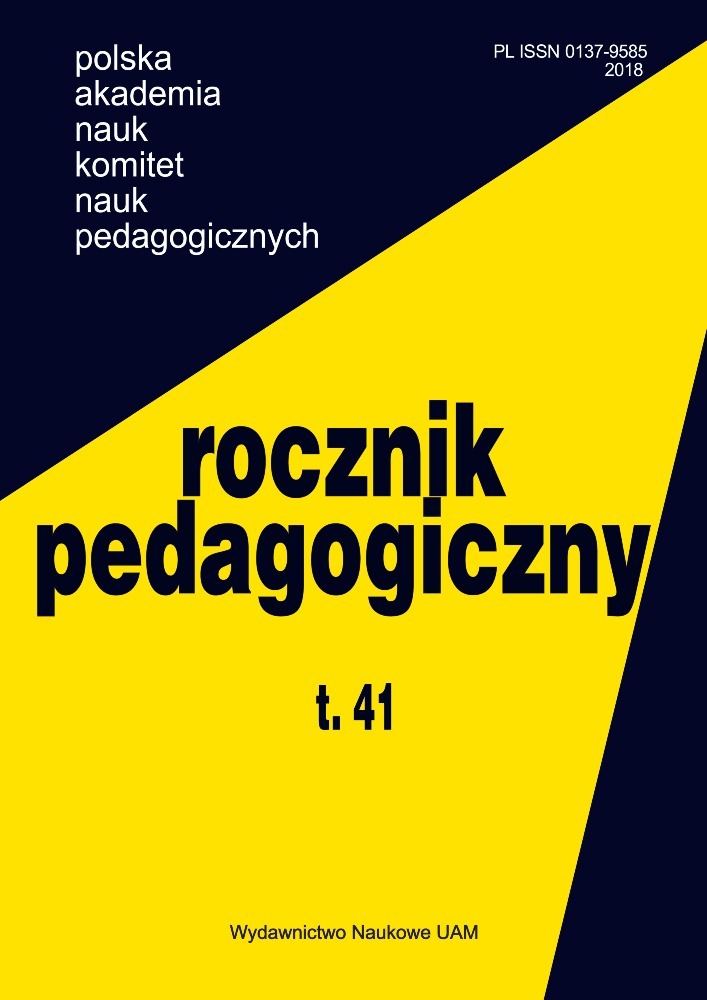Abstrakt
The aim of the article is to analyse various contexts of passion perceived as an important com- ponent of researcher’s identity. First, passion is confronted with the concept if rationality which dominates the university thinking about research. Second, passion is considered in relations to in- trinsic and extrinsic motivation. Next, the author concentrates attention on factors which limit the passion development: present commercialization of research as well as their permanent indexation and evaluation, re-locating the researcher’s energy on permanent reporting and detailed juridization of academic reality. At the end the possibility of passion in contemporary research is optimistically confirmed by the idea of academic community and academic freedom.
Bibliografia
Altbach P.G., The International Academic Crisis? The American Professoriate in Comparative Perspective, „Daedalus” 1997, vol. 126, nr 4.
Balkin J.M., The Proliferation of Legal Truth, „Harvard Journal of Law and Public Policy” 2003, vol. 26, nr 1.
Bloch C., Passion and Paranoia: Emotions and the Culture of Emotions in Academia, Routledge, London–New York 2016.
Brown R.H., Clignet R., Democracy and Capitalism in the Academy: the Commercialization of American Higher Education, [w:] Knowledge and Power in Higher Education, red. R.H. Brown, J.D. Schubert, Teachers College, New York–London 2000.
Curran T., Hill A.P., Appleton P.R., Vallerand R.J., The psychology of passion: A meta-analytical review of a decade of research on intrapersonal outcomes, „Motivation and Emotion” 2015, vol. 39.
Cybal-Michalska A., Młodzież akademicka a kariera zawodowa, Impuls, Kraków 2014.
Espeland W.N., Stevens M.L., A Sociology of Quantification, „Archives of European Sociology” (AES) 2008, vol. 49, nr 3.
Grinnell F., Everyday Practice of Science: Where Intuition and Passion Meet Objectivity and Logic, Oxford University Press, New York 2009.
Gromkowska-Melosik A., Elitarne szkolnictwo średnie. Między reprodukcją społeczno-kulturową a ruchliwością konkurencyjną, Wydawnictwo Naukowe UAM, Poznań 2015.
Halonen S.M., Lomas T., A passionate way of being: A qualitative study revealing the passion spiral, „International Journal of Psychological Research” 2014, vol. 7, nr. 2.
Haskell T.L., Justifying the Rights of Academic Freedom in the Era of „Power/Knowledge”, [w:] The Future of Academic Freedom, red. L. Menand, University of Chicago Press, Chicago–London 1996.
Hasselbladh H., Kallinikos J., The Project of Rationalization: A Critique and Reappraisal of Neo-Institutionalism in Organization Studies, „Organization Studies” 2000, vol. 21, nr 4.
Holton G., Einstein, History, and Other Passions: The Rebellion Against Science at the End of the Twentieth Century, American Institute of Physics Press, Woodbury, New York 1996
Horney K., Nasze wewnętrzne konflikty, Dom Wydawniczy REBIS, Poznań 2010.
Jaskulska S., O wyrastaniu z pasji, „Rocznik Pedagogiczny” 2015, t. 38.
Keane J., The Legacy of Max Weber, [w:] J. Keane, Public Life and Late Capitalism: toward a socialist theory of democracy, Cambridge University Press, New York 1984.
Melosik Z., Biurokratyzacja i instytucjonalizacja biografii: strategie regulowania tożsamości, [w:] tenże, Kultura popularna i tożsamość młodzieży. W niewoli władzy i wolności, Impuls, Kraków 2013.
Melosik Z., Jurydyzacja codzienności: bezradność jednostki w obliczu normy i prawnika, [w:] tenże, Kultura popularna i tożsamość młodzieży. W niewoli władzy i wolności, Impuls, Kraków 2013.
Melosik Z., Uniwersytet i społeczeństwo. Dyskursy wolności, wiedzy i władzy, Impuls, Kraków 2009.
Melosik Z., Wolność akademicka. Konteksty i rekonstrukcje, „Rocznik Lubuski” 2015, t. 41, cz. 2.
Melosik Z., Wskaźnikowanie człowieka i rzeczywistości jako forma sprawowania władzy, [w:] tenże, Kultura popularna i tożsamość młodzieży. W niewoli władzy i wolności, Impuls, Kraków 2013.
Parsons T., Platt G.M., The American University, Harvard University Press, Cambridge, Massachusetts 1975.
Quigley S.A., Academic Identity: A Modern Perspective, „Educate” 2011, vol. 11, nr 1.
Ryan R.M., Deci E.L., Self-Determination Theory and the Facilitation of Intrinsic Motivation, Social Development, and Well-Being, „American Psychologist” 2000, vol. 55, nr 1.
Stensaker B., Henkel M., Välimaa J., Sarrico C.S., Introduction: How is Change in Higher Education Managed, [w:] Managing Reform in Universities. The Dynamics of Culture, Identity and Organizational Change, red. B. Stensaker, J. Valimaa, C. Sarrico, Palgrave Macmillan, New York 2012.
Vallerand R.J., Blanchard C., Mageau G.A., Koestner R., Ratelle C., Léonard M., Gagne M., Marsolais J., Les Passions de l’Âme: On Obsessive and Harmonious Passion, „Journal of Personality and Social Psychology” 2003, vol. 85, nr 4.
Vansteenkiste M., Lens W., Deci E.L., Intrinsic Versus Extrinsic Goal Contents in Self-Determination Theory: Another Look at the Quality of Academic Motivation, „Educational Psychologist” 2006, vol. 41, nr 1.
